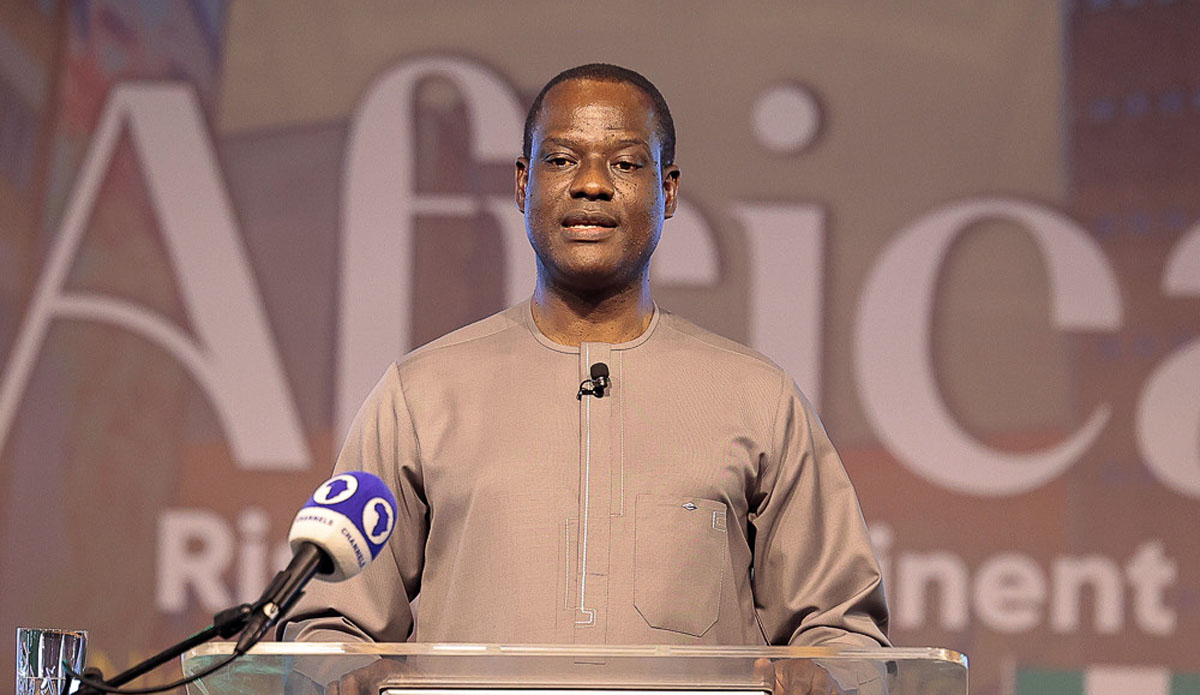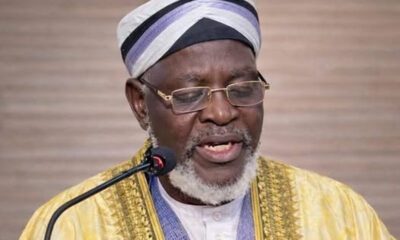metro
Lagos unveils plans to turn Otto, Otumara slums into modern cities

- Extend development plans to 30 other communities
By Dada Jackson
The Lagos State Government has disclosed its plans to turn Otto and Otumara slums into habitable modern communities in the mainland axis of the state.
The disclosure was made by the Commissioner for Physical Planning and Urban Development, Dr Idris Salako, during the annual ministerial press briefing, held at the Bagauda Kaltho Press Centre, Secretariat, Alausa, Ikeja.
According to the commissioner, the move, which is in line with the THEMES Agenda of the Governor Babajide Sanwo-Olu administration, wlll culminate in the creation of a new Micro City with better urban aesthetics and vibrancy in Otto and Otumara.
He added that the creation of the Micro City in those locations would complement the proposed revamping of the National Arts Theatre by the Federal Government, through the CBN- led Committee of Bankers.
Salako stated that the Micro City would be delivered with the upgrade of existing socio-economic amenities such as hospitals/clinics, schools, market and water, which would be upgraded in-situ.
He added that there would be preservation and conservation of ecologically sensitive land spaces such as buffer zones, earth drain, floodplains and waterfronts as well as the creation of new viable economic activity centres, including residential-led mixed use.
Meanwhile, the state government through the Ministry of Physical Planning and Urban Development has extended development plans to 30 other communities, spread across different local government areas of the state.
Salako stated this at the press briefing on Thursday, adding that the ministry had prepared the local/action plans for the communities through the Lagos State Physical Planning Permit Authority (LASPPPA).
He named the communities that had had their local/ action plans so prepared as Lafiaji Action Area Plan (2021-2031) in Eko District, Abule Oja Action Area Plan (2021-2031), Ajiwe Action Area Plan(2021-2031), Review of Maiyegun and Action Area Plan of an Extension to Aparakaja Casia/Abiodun Dada.
He added that the ministry undertook the Review of Ojodu Core Action Area Plan and prepared Ilo Awela Community Action Area Plan, Igbogbo Core Action Area Plan and Ologunebi Excised Village Action Area Plan as well as Shasha Oguntade Action Area Plan and Ladipo Osoro Action Area Plan among others.
Salako noted that the state would derive maximum benefits from the preparation of the action area plans, including the effective control and proper development guide within its jurisdiction; functional land use pattern and arrangements; good road networks while urban regeneration of the slum environment would be achieved.
Other benefits are the provision of enabling environment for category of land uses, such as industrial, commercial, institutional and residential as well as investments in a sustainable manner.
The commissioner also explained that the development plans would bring about the provision of quality infrastructural developments within the planned area and guarantee a sustainable physical environment during the stipulated planning period.
He added that in pursuit of the THEMES Agenda the Ministry also prepared Development Guide Plans for some Excised Villages in the State.
” In same vein and with due cognition of the need to extend physical planning administration to Non-Schemed Areas, Development Guide Plans are being prepared to make the Excised Villages more sustainable,” he said.
According to the Commissioner, Development Guide Plans were prepared for many villages in different local government areas of the state.
The areas are Onimedu Eleputu, Lakowe, Adeba, Bogije, Igando-Oja and Awoyaya in Ibeju-Lekki L.G.A; Ajangbadi, Kemberi and Ketu Ijanikin in Ojo L.G.A; Parafa and Gberigbe in
Ikorodu L.G.A and; Sangotedo and Langbasa in Eti-Osa LGA.
Development Guide Plans were also extended to Suberu-Oje in the Alimosho LGA; Apa (Parcel A) in the Badagry LGA; Ibowon in Epe LGA and Tedi in the Amuwo-Odofin LGA, he stated.
metro
Village Head, 33 Others Arrested Over Police Officer’s Death in Niger

Village Head, 33 Others Arrested Over Police Officer’s Death in Niger
Security agencies in Niger State have arrested a village head and 33 other suspects following the killing of Police Constable Emmanuel Shamsi and the burning of an NSCDC patrol vehicle during a violent confrontation linked to illegal mining activities in Zuzungi, Katcha Local Government Area.
The Nigeria Security and Civil Defence Corps (NSCDC), Niger State Command, confirmed the arrests, stating that 34 suspects are now in custody. Nineteen of the suspects were apprehended at the village head’s residence in Zuzungi Gwari, Kataeregi, where they had sought refuge after the incident. The remaining fifteen suspects were intercepted while attempting to flee the community.
The deadly incident occurred last Wednesday during a joint security patrol involving the NSCDC, Nigeria Police Force (NPF), and the local Anti-Drugs Control (ADC) outfit. The patrol was conducted in the mining area operated by Millennium Metals Mining Company, as part of ongoing efforts to curb illegal mining and mineral smuggling in the state.
READ ALSO:
- NSCIA Secretary-General Clarifies Council Receives No Government Funding
- Saudi Supreme Court Calls on Muslims to Sight Ramadan Crescent Moon on Tuesday Evening
- Nigeria Tax Act 2025: FG Clarifies No New Construction or Bank Taxes
According to NSCDC Commandant Suberu Siyaka Aniviye, the security team intercepted individuals allegedly involved in illegal mining and the smuggling of minerals, but the suspects violently resisted. The confrontation escalated, leading to the destruction of an NSCDC patrol Hilux vehicle and the tragic death of Police Constable Emmanuel Shamsi in the line of duty. Security personnel tactically withdrew to prevent further casualties before launching an operation to apprehend the perpetrators.
Authorities describe the arrest of the village head and 33 others as part of a broader crackdown on criminal elements in Niger State’s mining communities. The arrests aim to ensure that justice is served for the slain officer and to reinforce lawful compliance within the solid minerals sector.
The incident has sparked condemnation from government officials, including Dr. Dele Alake, Minister of Solid Minerals Development, who described the killing as “criminal murder” and assured that security and intelligence agencies are on high alert. He further pledged that violent resistance to lawful mining operations will not be tolerated.
Illegal mining in northern Nigeria has increasingly resulted in violent confrontations with security forces, highlighting the risks faced by law enforcement and the need for stronger enforcement and community engagement to curb criminal activities. Investigations into the role of each suspect are ongoing as authorities prepare legal proceedings against those involved.
Village Head, 33 Others Arrested Over Police Officer’s Death in Niger
metro
Nigeria Tax Act 2025: FG Clarifies No New Construction or Bank Taxes

Nigeria Tax Act 2025: FG Clarifies No New Construction or Bank Taxes
The Federal Government has dismissed claims that the Nigeria Tax Act 2025 imposes a 25% tax on building materials, construction-related funds, business expenses, or money in bank accounts. The government described the viral video circulating on social media as false and misleading, adding that the law, which has already taken effect, does not postpone implementation until 2027.
Taiwo Oyedele, Chairman of the Presidential Fiscal Policy and Tax Reforms Committee, said the misinformation misrepresents the objectives of the Tax Act, which are to lower housing costs, support real estate development, and encourage economic growth. He clarified that the video’s claims — that the law would start in 2027 and impose a 25% levy on construction transactions — are both inaccurate.
Under the new law, several housing and construction reliefs have been introduced. Land and buildings are exempt from Value Added Tax (VAT) under Section 185(l), while contractors can recover VAT on materials and services, reducing overall construction expenses. The Withholding Tax (WHT) rate on construction contracts has been lowered to 2%, improving cash flow for developers. Individuals building owner-occupied homes can deduct mortgage interest, and property owners earning rental income may deduct expenses such as repairs, insurance, and agency fees. These provisions are designed to make housing projects more affordable and attractive to investors.
READ ALSO:
- Israeli Airstrikes Kill 12 in Gaza as Violence Persists Despite Ceasefire
- FBI Probe Continues as Ex‑Church Minister Who Confessed to Child Abuse Remains Free
- Presidency Dismisses El-Rufai’s Thallium Claim as Diversion From N432bn Probe
The Act also offers direct support for renters and low-income earners. Eligible tenants can claim rent relief of up to ₦500,000, equivalent to 20% of annual rent, while rent payments are fully exempt from VAT. Lease agreements below ₦10 million per year, or less than ten times the national minimum wage, are also exempt from stamp duty. These measures are expected to increase disposable income for low-income households and reduce the financial burden of housing.
Incentives under the Act extend to investors and businesses in the construction and real estate sectors. Individuals are exempt from Capital Gains Tax when selling a dwelling house or interest in one. Real Estate Investment Trusts (REITs) distributing at least 75% of dividends or rental income within 12 months are exempt from Companies Income Tax. Manufacturers of building materials, including iron, steel, and domestic appliances, may qualify for tax holidays of up to 10 years, while large businesses could see Companies Income Tax reduced from 30% to 25%. These provisions are intended to encourage investment, stimulate local production, and support the growth of the housing sector.
The Tax Act also includes provisions that relieve workers and small businesses. The taxable value of employer-provided accommodation is capped at 20% of an employee’s annual gross income, excluding rental value. Small companies that qualify under the Act will pay 0% Companies Income Tax, are exempt from charging VAT, and are not required to deduct Withholding Tax from invoices and payments. These measures reduce the compliance burden on smaller businesses and support entrepreneurship.
The committee also clarified what the Act does not include. It does not tax money in bank accounts, does not impose 25% taxes on construction costs or building materials, and does not delay implementation until 2027. Officials described claims suggesting otherwise as misleading and urged Nigerians to rely on verified government sources for accurate information. According to the committee, the Tax Act is intended to make housing more affordable, reduce rent, and stimulate economic growth, not to increase taxes on citizens or businesses.
Nigeria Tax Act 2025: FG Clarifies No New Construction or Bank Taxes
metro
Residents Flee as Gunmen Launch Fresh Attack on Kwara Community

Residents Flee as Gunmen Launch Fresh Attack on Kwara Community
Barely 24 hours after armed bandits attacked communities in Patigi Local Government Area and Edu Local Government Area, suspected terrorists on Sunday night carried out a fresh attack on Share, the headquarters of Ifelodun Local Government Area, forcing residents to flee for safety.
The attack reportedly occurred around 8:00 pm, when heavily armed gunmen stormed the town and began shooting indiscriminately, throwing the community into panic and confusion. Residents said the sustained gunfire lasted for a prolonged period, prompting many families to abandon their homes and seek refuge in neighbouring areas.
Eyewitnesses, who spoke on condition of anonymity, said the assailants appeared to be on a targeted mission, allegedly searching for specific individuals. One resident claimed the gunmen were looking for a person identified as Zulu Alfa Dako, adding that the attackers entered the town from a nearby axis.
“Kidnappers have entered Share; everyone is running for safety,” a resident said. “They kept shooting endlessly and the whole town was thrown into chaos.”
READ ALSO:
- DSS Probes El-Rufai’s Claim of Toxic Chemical Import by Ribadu
- Senate Explains Why Real-Time E-Transmission Cannot Be Mandatory in 2027 Elections
- Osun PDP Lawmakers Endorse Tinubu for 2027, Back Adeleke Re-Election
Another resident, overwhelmed by fear, said while the attackers targeted some individuals, it was still unclear whether anyone was abducted during the operation.
“The gunmen entered the town and caused havoc by shooting non-stop. I don’t know if anyone has been kidnapped yet,” the resident said.
Efforts to get immediate comments from the Kwara State Police Command spokesperson, SP Adetoun Ejire-Adeyemi, were unsuccessful as of press time.
However, the Kwara State Government later confirmed that the attackers were repelled by security forces. The Special Assistant on Communication to Governor Abdulrahman Abdulrazaq, Ibrahim Abdullateef, said combined security operatives swiftly responded to distress calls and engaged the gunmen.
“Local security sources have reported that bandits that were reportedly attacking Share community, Ifelodun LGA, have been successfully repelled by combined security forces,” Abdullateef said in an update.
He added that the exchange of gunfire lasted for about one hour, noting that no death or abduction has been officially recorded so far, though security agencies are still monitoring the situation.
The latest attack came against the backdrop of rising insecurity in Kwara State, following bandit raids on communities in Edu and Patigi LGAs, where four people were kidnapped and several others injured. The back-to-back attacks have heightened fear among residents and renewed calls for stronger security presence, improved intelligence gathering, and sustained patrols across vulnerable communities.
Residents Flee as Gunmen Launch Fresh Attack on Kwara Community
-

 Education22 hours ago
Education22 hours agoCheck Your Name: UNILORIN Releases Updated NELFUND Refund List for 2024/2025 Students
-

 News14 hours ago
News14 hours agoOsogbo Sons and Daughters Mark 5th Anniversary with Awards, Political Undertones
-

 metro2 days ago
metro2 days agoWoman Arrested Over Murder of Nigerian E-Hailing Driver in South Africa
-

 metro2 days ago
metro2 days agoBoko Haram Terrorists Release Video of 176 Abducted Kwara Residents
-

 News1 day ago
News1 day agoAfenifere Calls for Immediate Take-Off of State Police as Terror Threats Rise in Yorubaland
-

 metro3 days ago
metro3 days agoCourt Orders DIA to Produce Cleric Accused of Coup Plot by February 18
-

 metro1 day ago
metro1 day agoUS Military Boosts Support for Nigeria’s Fight Against Insurgency With Ammunition, Troop
-

 metro24 hours ago
metro24 hours agoArgungu Festival 2026 Highlights Peace, Stability, Economic Growth — Tinubu



